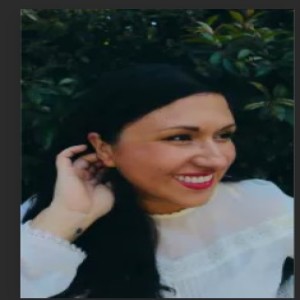
26K
Downloads
304
Episodes
The Chills at Will Podcast is a celebration of the visceral beauty of literature. This beauty will be examined through close reads of phrases and lines and passages from fiction and nonfiction that thrills the reader, so much so that he wants to read again and again to replicate that thrill. Each episode will focus on a different theme, such as "The Power of Flashback," "Understatement," "Cats in the Cradle," and "Chills at Will: Origin Story."
Episodes

Tuesday Aug 16, 2022
Tuesday Aug 16, 2022
Episode 137 Notes and Links to Vanessa Angélica Villarreal ’s Work
On Episode 137 of The Chills at Will Podcast, Pete welcomes Vanessa Angélica Villarreal, and the two discuss, among other topics, Vanessa’s upbringing, her bond with her beloved grandmother, religion and indigenous traditions in her family and in her communities, punishing and overbearing institutions that oppressed her as a student, finding solace in books and poetry and bands, and ideas both historical and personal that inform her standout poetry collection.
Vanessa Angélica Villarreal was born in the Rio Grande Valley to Mexican immigrants. She is the author of the award-winning collection Beast Meridian (Noemi Press, Akrilica Series 2017), recipient of a 2019 Whiting Award, a Kate Tufts Discovery Award nomination, and winner of the John A. Robertson Award for Best First Book of Poetry from the Texas Institute of Letters. Her writing has appeared in The New York Times, Harpers Bazaar, Oxford American, POETRY, and elsewhere. She is a recipient of a 2021 National Endowment for the Arts Poetry Fellowship and a doctoral candidate at the University of Southern California in Los Angeles, where she is working on a poetry and nonfiction collection while raising her son. Her essay collection, CHUECA, is forthcoming from Tiny Reparations Books, an imprint of Penguin Random House, in 2023. Find her on Twitter @Vanessid.
Vanessa Angélica Villarreal's Website
Vanessa Angélica Villarreal's Wikipedia Page
Review of Beast Meridian for Pleiades Magazine
At about 2:35, Vanessa talks about beginning to read at a young age, and how her dad’s music compelled her to read liner notes and still informs her writing
At about 3:30, Vanessa talks about childhood bilingualism and some early writing based on the loss of her beloved grandmother
At about 4:40, Vanessa describes the resultant grief and rebellion after her grandmother’s death, as well as how her mistreatment in school led her to be part of a backwards educational/carceral experience
At about 7:35, Vanessa discusses grunge and other 90s music-”angsty” and “against the Man”-and how they led her on a path to poetry
At about 8:30, Vanessa describes Paul Celan as an inspiration for critiquing language in rebellious and “seek the haunted”
At about 9:35, Vanessa talks about how her poetry career took a pause as she began to work long hours at an early age
At about 11:20, Pete cites the famous quote about “art being a luxury” and Angelica adds that she considers it a birthright”
At about 12:30, Pete and Vanessa fanboy and girl about the previously-mentioned musicians, and Vanessa cites these creatives as “Romantics” and writers of beautiful and “strange” lyrics
At about 15:00, Vanessa responds to Pete’s questions about where her musical/lyrical sensibilities were born, and she expands on ideas of repetition and prayer derived from her father
At about 16:50, Vanessa speaks of “writing toward the body” in a lot of her work, “creating an understanding of the body”; she compares this writing to a chord change
At about 18:20, Vanessa highlights her father as “an intuitive composer” and his facility with sound and writing
At about 21:20, Vanessa discusses inspirational and formative writers in her writing journey, including Celan, Aase Berg, Harmony Holliday, Ronaldo Wilson & Duriel Harris & Dawn Lundy Martin (The Black Took Collective), and Jennifer Tamayo
At about 25:10, Vanessa discusses the implications and subtleties of nomenclature around Chicanx/Latinx/Mexican-American identities
At about 26:30, Pete asks Vanessa about the implications of the term pocha and Malinche and ideas of women as traitors is discussed
At about 30:15, Vanessa gives background on the famous quote by José Vasconselos
At about 33:10, The two begin discussing Beast Meridian; Pete compliments Vanessa’s original use of verbs
At about 34:40, Pete’s question about the poet as speaker leads Vanessa to discuss background for the poetry collection and the ways in which she approached the pages and with what questions in mind
At about 38:15, Vanessa discusses implications of her epigraphs, including ideas put forth by Frantz Fanon and Gloria Anzaldua’s ideas of Nepantla
At about 41:35, Vanessa cites Christopher Soto’s work discussing implications for Nepantla
At about 42:40, Pete references the collection’s first poem
At about 43:40, Vanessa reads the poem “Angélica: An Elegy” and describes the importance of the poem ending with a colon (:)
At about 45:40, The two discuss ideas of Malinche and her contemporary reimagining and Malinche’s connections to a poem in the collection
At about 47:00, Vanessa cites femicides in Tijuana and among indigenous women and “Irish Murder Ballads” as stimulus for her collection
At about 50:15, Vanessa and Pete discuss the myriad meanings of her connected “assimilation poems”: connections to Malinche, inversion, Spanglish, the use of footnotes, comparisons of “Girl” by Kincaid, strong metaphors, etc.
At about 53:20, Vanessa gives her definition of “assimilation” and speaks of ideas of identity/agency
At about 57:40, Pete points out beautiful and memorable lines from Vanessa’s work, especially regarding the ideas connected to “parallax”
At about 1:00:20, Vanessa remarks that “100% on her mind” was generational trauma and ideas of ancestral memory as she wrote the collection
At about 1:02:20, Pete wonders about the animals and mythology used in Part II and how they relate to real people in Vanessa’s life
At about 1:05:40, The two discuss the salient theme of loss in the collection, with a special emphasis on “Dissociative States”
You can now subscribe to the podcast on Apple Podcasts, and leave me a five-star review. You can also ask for the podcast by name using Alexa, and find the pod on Stitcher, Spotify, and on Amazon Music. Follow me on IG, where I’m @chillsatwillpodcast, or on Twitter, where I’m @chillsatwillpo1. You can watch other episodes on YouTube-watch and subscribe to The Chills at Will Podcast Channel. Please subscribe to both my YouTube Channel and my podcast while you’re checking out this episode.
This is a passion project of mine, a DIY operation, and I’d love for your help in promoting what I’m convinced is a unique and spirited look at an often-ignored art form.
The intro song for The Chills at Will Podcast is “Wind Down” (Instrumental Version), and the other song played on this episode was “Hoops” (Instrumental)” by Matt Weidauer, and both songs are used through ArchesAudio.com.
Please tune in for Episode 138 with Miguel Valerio. Prof. Valerio earned his PhD from The Ohio State University. His research and teaching focus on the African diaspora in the literature and culture of the Iberian world from the late medieval period to the present. His dissertation focused on black cultural agency vis-à-vis religious confraternities and public festivals in the early modern Iberian Atlantic, particularly colonial Mexico City and Bahia, Brazil. His work has appeared in Afro-Hispanic Review, Confraternitas, and the edited volume Afro-Catholic Festivals in the Americas. He is currently completing his first book, The Black Kings and Queens of Colonial Mexico City: Identity, Performance, and Power, 1539-1640.
The episode will air on August 19.

No comments yet. Be the first to say something!